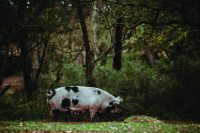Farm wills & succession planning: Providing inheritance without disputes

25th August 2021
-
Julia Banwell See profile
Passing the farm onto the next generation is an aspiration for many farmers, but often there’s more than one child to pass assets onto. So what options are there for providing non-farming children with an inheritance?
For any farming family with more than one child there will be a point at which the topic of inheritance is raised and how the assets will be divided, particularly if not all the children are involved in the farming business.
On the whole, most will want to keep the farm as intact as possible, so how can parents provide for their non-farming offspring? What are the available options and considerations?
When considering inheritance planning, there may often be a real dilemma for parents. Often, when someone is faced with breaking up their estate, they ask what is fair – and this is down to the individual and their circumstances.
We always explain that fair doesn’t necessarily mean equal, as fair is your own assessment of what you believe is right. So when you’re considering how to divide assets between the children, the most important thing is that you’re comfortable with how the assets will be split, whether that is equal or not.
Each situation will be different, with unique relationships, promises or assurances of who is getting what – which can bring about proprietary estoppel cases (where a farming sibling goes to court to claim a larger share) if care isn’t taken.
Though it’s up to the parents how they divvy things up, thinking about whether the farming child had a full or reduced wage is one sensible consideration. If the farming child has had a proper wage, you may feel that they don’t necessarily need compensating in the Will in the same way that they might if they have worked for a lesser wage.
Those on a proper wage have had the chance to plan their own finances and perhaps invest off farm, whereas those on token wages may have made both family and monetary sacrifices to continue working for the business.
Another consideration is the care of the older generation. Are parents expecting to live on-farm and for the farming child to care of them? If so, this could be a significant personal and financial obligation and is therefore worth taking this into account when dividing assets among your children.
Family farmers often have farm cottages, pensions, savings or buy-to-let properties which can be used to provide a lump sum to non-farming children.
Though cottages often remain with the farm, they could be left to non-farming children with the Will containing a set option or covenant for the farming child to have first refusal to purchase them if and when sold.
If property assets are off-farm, like buy-to-lets, this is less likely to be a necessity.
There is also an option to nominate pensions upon death to the non-farming children, and savings and cash funds could be similarly used.
However, it’s important to work through the tax implications of passing down any off-farm assets. If the farm is left to one child and everything else is left to non-farming children, care needs to be taken to ensure that any Inheritance Tax (IHT) due doesn’t fully use the ‘residual estate’, leaving the non-farming children to foot the bill.
It may be that a clause will be needed in the Will to split the IHT liability. If this isn’t done, the farm may be subject to some IHT reliefs while the remaining assets won’t, with IHT calculated across the entire estate before it’s divided. The non-farming children could then have to foot such an enormous bill from their share that they’re left with very little in the end.
Where there are no off-farm assets, there is the option to divide the farm – though this is rarely the preferred choice. In this situation, the main farm area could be left to the farming child, with outlying land allocated to the other children – again perhaps with an option to purchase stated in the Will for the farming child.
Alternatively, the entire farm could also be left to all of the descendants, with some or all of it in trust. This means that if land is sold, the proceeds will be split between all of them.
You may feel that it’s sensible to treat land with development potential differently to the rest of the farm, as it will save issues between children down the line – and will allow for any potential windfall to be split between the family.
It’s possible to leave land with development potential in trust to all children, with a proviso that it can be let to the farming child. Then, if it goes to development the proceeds can be split between all intended beneficiaries.
It could also just be left to the non-farming children with an option for the farming child to rent it until development occurs, which may be the simpler option.
Transferring this type of land to a trust before death could allow for the added benefit of locking in Agricultural Property Relief or Business Property Relief as they are set at present.
Before planning permission has been sought on development land it may be possible for it to be passed on without any immediate tax consequences – as it may benefit from holdover relief when gifted to a trust. If it already has planning permission, steps can be taken to alleviate the tax burden, but expert advice is recommended as it’s more challenging after the event.
Where there are no off-farm assets to divide, but parents want to provide for their non-farming children, there is the option to pay premiums into an insurance policy, such as a Whole of Life policy. This is an insurance policy which pays out a lump sum upon death – providing the premiums are paid throughout your lifetime.
Though it involves paying a premium every month, it can be far more cost-effective than the farming child needing to borrow money to pay off their siblings.
As an example, if a male aged 65 and a female age 62, both non-smokers, wanted a £1 million pay out with a fixed premium, it would cost £1,663/month for the rest of their lives – or just under £20,000/year. It would take more than 50 years for them to have paid into the policy the amount to be received, taking them to age 115 and 112 respectively. Barring any significant advancements to medical science, this would be highly unlikely. Even if they live for another 30 years, the total payments into the policy would cost just under £600,000.
A smaller pay-out will reduce the monthly payments. For example, a pay out of £500,000 would mean a monthly premium of £831.50; approximately £10,000/ year.
In comparison, if the farming child has to take out a £1 million loan upon death to buy out their siblings at an interest rate of 3.5% over 25 years, this would cost them £5,006/month; just over £60,000/year.
They would need to repay both the original borrowed sum of £1 million, plus interest – taking the total cost of actioning this post death to around £1.5 million. Like most things, it’s significantly less expensive if it’s possible to plan for this in advance.
It’s also possible to take out flexible rate policies which start with small premiums that are far more attractive, but can increase exponentially over the years and suddenly become unaffordable. If the policyholders then default on the intimidating monthly payments, it cancels the policy. This is why fixed rate premiums offer an advantage; if they can be afforded today, it’s more likely they will be affordable going forward.
These types of policies, when written under trust, don’t form part of the estate for IHT and mean non-farming children can have something without the farm being split up.
Though these monthly payments might look like a drain on the farm finances, the parents are still around to support the business. It’s also likely to be a far more affordable option than having to borrow to pay out siblings.
These are examples only and premiums will vary depending on age, health and the amount of cover required. Full professional advice should be sought before taking any action.
There are many aspects and options to consider before drawing your conclusions. Given the link between the farm, Wills and succession planning it’s sensible to involve all parties to help you reach the most equitable solution for your own family, providing significant peace of mind in later years. For further information and help please get in touch.



